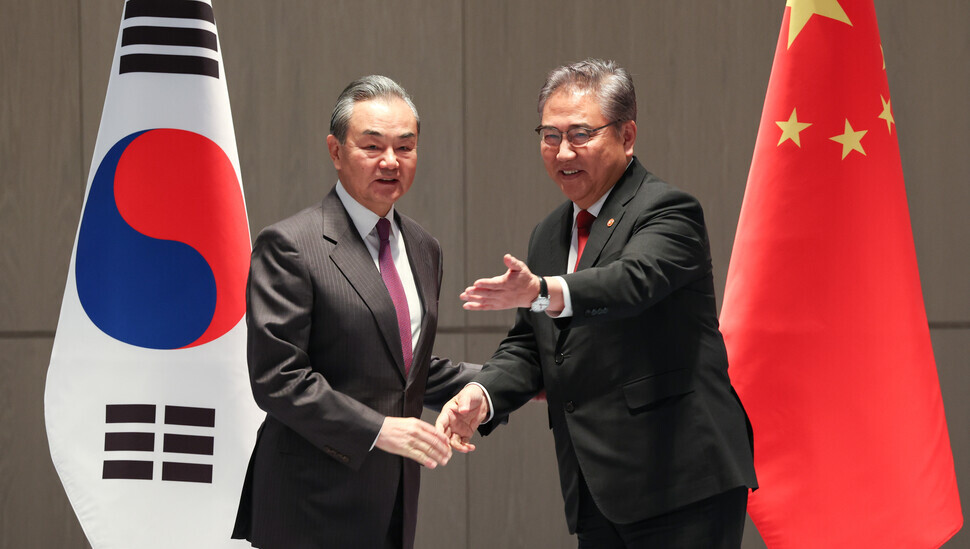hankyoreh
Links to other country sites 다른 나라 사이트 링크
China cautions S. Korea against politicizing economic issues in meeting of top diplomats

During a meeting with his South Korean counterpart on Sunday, China’s top diplomat emphasized the need to “resist the politicization of economic issues,” in an apparent reference to the United States.
Foreign Minister Wang Yi of China, in Busan for a meeting between the foreign ministers of South Korea, China, and Japan, met with South Korea’s Foreign Minister Park Jin that morning. There he urged the two countries to “jointly resist the tendency of politicizing economic issues, instrumentalizing science and technology issues, and securitizing trade issues.” He also stressed the necessity of maintaining “a stable and smooth production and supply chain to foster greater trade development between the two nations.”
Wang appeared to be referencing the economic and trade sanctions imposed by the US and its allies on China aimed at restructuring supply chains. The US government has imposed strict controls on semiconductor manufacturing equipment and advanced semiconductor exports to China, which it put in place to prevent the transfer of key technologies like semiconductors and artificial intelligence, ostensibly to protect the US chip industry and for security reasons. This move by Wang is interpreted as a rebuttal to the Yoon Suk-yeol administration’s perceived pro-US bias.
Furthermore, Wang pointed out that China and South Korea have become “highly integrated partners” in terms of interests and production and supply chains, adding that “China, with its complete industrial system and vast market, will open itself up more and continuously provide new opportunities for mutual benefit and cooperation between China and South Korea.”
In response, Park, as reported by the Chinese Foreign Ministry, conveyed South Korea's desire to “strengthen dialogue and communication with China, deepen economic and trade cooperation, maintain supply chain stability, and promote people-to-people and cultural exchanges, all contributing to the ongoing development of the strategic cooperative partnership between the two countries.”
On the subject of the anticipated South Korea-China-Japan summit, Park expressed hope that the meeting between the countries’ foreign ministers will yield “positive results and deepen cooperation between the three countries.” Wang reciprocated by noting that China “supports South Korea in hosting the meeting between the foreign ministers of South Korea, China and Japan and is willing to work with South Korea and Japan to revamp and restart trilateral cooperation.”
Addressing North Korea’s recent satellite launch, Wang reiterated China's longstanding position that it has “always played a constructive role in easing the situation on the Korean Peninsula and will continue to do so in the future.” This statement aligns with the earlier remarks made by Mao Ning, the spokesperson for the Chinese Foreign Ministry, who said, “[The] history and crux of the Korean Peninsula issues are clear. China is not the focal point of the issues. It is the US that holds the key to resolving them.”
By Choi Hyun-june, Beijing correspondent
Please direct questions or comments to [english@hani.co.kr]

Editorial・opinion
![[Column] Tariffs on China: Trump was dumb, Biden dumber [Column] Tariffs on China: Trump was dumb, Biden dumber](https://flexible.img.hani.co.kr/flexible/normal/500/300/imgdb/original/2024/0520/191716191153918.jpg) [Column] Tariffs on China: Trump was dumb, Biden dumber
[Column] Tariffs on China: Trump was dumb, Biden dumber![[Column] What if Seoul took reunification by force off the table? [Column] What if Seoul took reunification by force off the table?](https://flexible.img.hani.co.kr/flexible/normal/500/300/imgdb/original/2024/0520/3017161928630494.jpg) [Column] What if Seoul took reunification by force off the table?
[Column] What if Seoul took reunification by force off the table?- [Editorial] Intensifying US-China rivalry means Seoul must address uncertainty with Beijing sooner than later
- [Column] When ‘fairness’ means hate and violence
- [Editorial] Yoon must stop abusing authority to shield himself from investigation
- [Column] US troop withdrawal from Korea could be the Acheson Line all over
- [Column] How to win back readers who’ve turned to YouTube for news
- [Column] Welcome to the president’s pity party
- [Editorial] Korea must respond firmly to Japan’s attempt to usurp Line
- [Editorial] Transfers of prosecutors investigating Korea’s first lady send chilling message
Most viewed articles
- 1Xi, Putin ‘oppose acts of military intimidation’ against N. Korea by US in joint statement
- 2Kim Jong-un wanted to meet with residents of shelled Yeonpyeong Island in South, Moon recalls in mem
- 3For new generation of Chinese artists, discontent is disobedience
- 4Berlin mayor hints at tearing down ‘comfort women’ memorial in city
- 5[Column] What if Seoul took reunification by force off the table?
- 6To weigh costs and benefits, Korea must stop treating US troop presence as a sacred cow
- 7[Column] Tariffs on China: Trump was dumb, Biden dumber
- 8China, Russia put foot down on US moves in Asia, ratchet up solidarity with N. Korea
- 9Putin’s trip to China comes amid 63% increase in bilateral trade under US-led sanctions
- 10[Exclusive] Unearthed memo suggests Gwangju Uprising missing may have been cremated